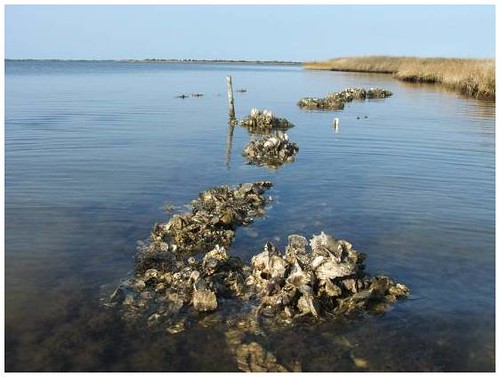Second Quarter 2022 Journal Round Up!
- Hynes, et al. 2022. “Estimating the costs and benefits of protecting a coastal amenity from climate change-related hazards: Nature based solutions via oyster reef restoration versus grey infrastructure.” Ecological Economics, vol 194.

While ecologists have known that nature-based solutions to problems like flooding and pollution control are in many cases less expensive and more efficient than human-made solutions, economists have been rather late to the party. A case in point is discovering that so-called “green infrastructure,” like restored wetlands or oyster reefs, can be better in many ways than “gray infrastructure,” or manufactured barriers to wave action.
This article investigates the recreational value associated with restoring an oyster reef bar that would act as a natural breakwater versus a permanent seawall on a coastal walking trail that is under threat from sea level rise and storm surge. The authors estimated the costs of protecting the walking trail under both scenarios, and found that the benefit-cost ratio of restoring the oyster reef was several times higher than the benefit-cost ratio of the manmade seawall. Moreover, the analysis does not include the positive ecosystem services that the oyster reef could provide above and beyond providing a natural breakwater, such as pollution control or carbon sequestration.
2. Huang, Yui and Woodward, R. 2022. “Spillover Effects of Grocery Bag Legislation: Evidence of Bag Bans and Bag Fees.” Environmental and Resource Economics (81:711–741)
This article investigates the unintended consequences of carryout grocery bag regulations by looking at the impact on sales of alternative plastic bags. The unfortunate conclusion of the article is that both the carry out bag ban and the carry out bag fee that they examined led to a significant increase in small plastic trash bag consumption. Whereas previous studies had looked at whether fees on single use plastic bags in grocery stores directly reduced the usage of those bags or increased recycled bag usage, this is one of the first studies to look at the indirect effects of such policies. Their hypothesis is that consumers reuse plastic grocery bags as trash can liners. When those bags either became more expensive or less available, consumers switched to purchasing small trash bags. This article highlights the importance of considering unintended consequences of well-meaning regulations.